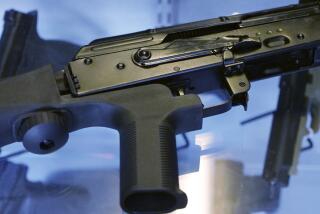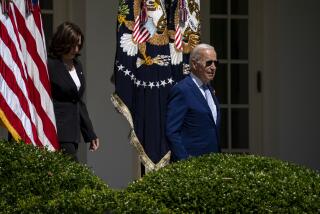Trump ‘supportive’ of tougher gun law, but his record suggests that may not mean much

President Trump called for regulations banning bump stocks for guns on Tuesday
The deadly school shooting in Florida has moved President Trump to call for a ban on devices that turn legal firearms into deadly automatic assault rifles. But some gun control supporters expressed skepticism: He has promised action before in response to a mass killing, only to drop it when Americans’ attention wanes.
Trump said on Tuesday that he had directed Atty. Gen. Jeff Sessions to “very soon” propose regulations to get rid of the so-called bump stocks that “turn legal weapons into machine guns.” There has been no indication that the shooter in Parkland, Fla., used such a device in killing 17 high school students and staff members, but aides say Trump will look at a range of remedies in coming days.
Aides to the president also say that he now favors efforts to improve the federal background check system, and that he has discussed the merits of doing so with Sen. John Cornyn of Texas, a Republican leader who has introduced a bill to make changes. The fact that the Parkland suspect, a mentally troubled teen, could so easily buy his AR-15 semiautomatic rifle has renewed criticism of the background check system.
Late Tuesday, Trump tweeted, “Whether we are Republican or Democrat, we must now focus on strengthening Background Checks!”
But Trump’s foray into policy talks is being met with skepticism based on his track record in office, his fluid stances on gun control and his close relationship with the National Rifle Assn. He backed an assault weapons ban and a longer waiting period for gun purchases in 2000, writing about it in one of his books, and then reversed that stance when he built a presidential campaign on an absolutist pro-gun interpretation of the 2nd Amendment.
Trump’s idea to ban bump stocks is not a new one. After the Las Vegas mass shooting in October, he signaled a willingness to discuss regulating or banning the kits that allow people — like the shooter in that case, who fired down on a crowd from his hotel suite — to make their legal semi-automatic rifles operate like illegal, rapid-fire automatic weapons. The administration later clarified that any crackdown should be regulatory, not statutory. That stance is shared by the NRA, which opposes any new gun control laws.
The result is that nothing happened, and the country moved on. Thus did the reaction to the Vegas massacre, the nation’s worst mass murder in modern times, follow a familiar pattern of years of gun control debates: Gun rights advocates stalled serious policy discussion after the tragedy by saying it was too soon to think of anything but the victims, yet as time passed so did the impetus for action.
“They’ll give a generic comment on how the president supports changes,” said Corey Ciorciari, director of policy at the progressive organization Democracy Forward, speaking of White House aides. “And that allows them to avoid scrutiny while people are talking about it. And then after people move on, you never hear another thing about it.”
For a long time before his 2016 campaign, Trump branded himself as a nonpartisan moderate on the issue of gun control. In 2000 he wrote that he generally opposed gun control but that he was OK with certain restrictions, and he attacked Republicans for their pro-NRA rigidity.
“The Republicans walk the NRA line and refuse even limited restrictions,” he wrote in his book “The America We Deserve.” “I generally oppose gun control, but I support the ban on assault weapons and I also support a slightly longer waiting period to purchase a gun.”
Trump held that point of view until he began gearing up for his run for the presidency. As social conservatives flocked to his rallies, he turned increasingly hard-line in opposing any limitations on gun ownership.
In the White House, he has acted in keeping with that posture. His appointees have quietly chipped away at the National Instant Criminal Background Check System, the federal system that stores consult to make sure buyers are eligible to purchase guns.
The administration officials narrowed a few legal definitions to make it harder to classify would-be gun buyers as ineligible. The FBI used to consider people “fugitives from justice” if there were outstanding warrants for their arrest, but now they must also have fled across state lines to intentionally avoid prosecution to be disqualified. Trump officials also purged tens of thousands of law enforcement records from the background system.
They narrowed the definition of mentally ill. And Congress and Trump rolled back an Obama-era regulation that required the Social Security Administration to send records of people receiving benefits for mental illness for inclusion in the background check system. In his recently released budget for the coming fiscal year, Trump proposed slashing millions of dollars from the budget for the background check system.
After the lone gunman opened fire on a concert crowd in Las Vegas on Oct. 1, the president appeared to waver for a moment in his view against gun controls. The gunman had attached bump stocks to his semiautomatic firearms, thereby turning them into machine guns that killed 58 people and injured hundreds more, and Trump hinted to reporters that he might support a proposed ban.
“We’ll be looking at that in the next short period of time,” he said.
The public moved on, though, and so did the conversation. Trump did not prod Congress to act.
Following the Parkland shooting, Trump once again is signaling that he is thinking things over. Two days after the massacre, which coincided with Ash Wednesday and Valentine’s Day, he and First Lady Melania Trump visited the hospital trauma center where many of the victims and the suspect were treated. A doctor told the New York Times that he observed a parent of one of the wounded teenagers urging Trump to make sure this kind of tragedy never unfolded again.
“We’re going to work on it,” the president told the parent, according to the doctor.
It is not clear that the federal Bureau of Alcohol, Tobacco, Firearms and Explosives has legal authority to ban bump stocks by regulation. In the past, the ATF has said it does not, meaning that gun manufacturers could challenge any new regulations.
The president spent a quiet weekend not far away from Parkland, at his Mar-a-Lago home, reportedly talking with friends about how to deal with the epidemic of mass shootings — and watching the surviving teens advocating on cable networks for gun controls. On Monday, a spokesperson issued a statement indicating that Trump had spoken with Cornyn.
Discussions on legislation were underway, the statement said, adding that the president was “supportive of efforts to improve the federal background check system.”
Twitter: @cparsons
UPDATES:
7:45 p.m: This article was updated to include a tweet from President Trump on background checks.
4:55 p.m: This article was updated to include that staff members died in the Florida school shooting.
This article originally published at 3:05 p.m.
More to Read
Get the L.A. Times Politics newsletter
Deeply reported insights into legislation, politics and policy from Sacramento, Washington and beyond. In your inbox three times per week.
You may occasionally receive promotional content from the Los Angeles Times.







